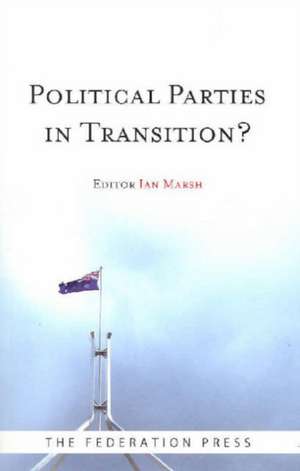Political Parties in Transition?
Editat de Ian Marshen Limba Engleză Paperback – 31 ian 2006
Preț: 201.48 lei
Preț vechi: 267.00 lei
-25% Nou
Puncte Express: 302
Preț estimativ în valută:
38.56€ • 40.11$ • 31.83£
38.56€ • 40.11$ • 31.83£
Carte indisponibilă temporar
Doresc să fiu notificat când acest titlu va fi disponibil:
Se trimite...
Preluare comenzi: 021 569.72.76
Specificații
ISBN-13: 9781862875937
ISBN-10: 1862875936
Pagini: 240
Dimensiuni: 334 x 167 x 15 mm
Greutate: 0 kg
Editura: Federation Press
ISBN-10: 1862875936
Pagini: 240
Dimensiuni: 334 x 167 x 15 mm
Greutate: 0 kg
Editura: Federation Press
Cuprins
Contents Australia’s political cartel? The major parties and the party system in an era of globalisation Ian Marsh Party structures and processes Dean Jaensch Party organisations and resources: Membership, funding and staffing Gary Johns Cartel parties and election campaigning in Australia Ian Ward The cartel parties model and electoral barriers Rodney Smith and John O’Mahony Ideological convergence between the major parties and the representation gap in Australian politics Ian Marsh The Nationals and the Democrats: Cracks and chips in the cartel? John Warhurst The Australian Greens: Challengers to the cartel Ariadne Vromen and Nick Turnbull The Australian party system, Pauline Hanson’s One Nation and the party cartelisation thesis Murray Goot New Zealand's multi-party system: Consolidation of the cartel model under proportional representation Raymond Miller
Recenzii
Is the representational role of political parties declining in Australia, as some political scientists claim to be the case in other countries? Do the established parties constitute a kind of cartel, preserving their own dominance and blocking new entrants? Do such trends bode ill for democracy? Such questions are the thematic element in this book, linking otherwise disparate chapters on the major Australian parties, their structures, organisation and resources, and election campaigns. Interesting chapters on the Nationals and the Democrats, and on the Greens and Pauline Hanson’s One Nation, broaden the coverage beyond the two major parties. Consideration of the Greens, in particular, shows that, even if the major parties do try to operate as cartels, they are not effective in practice in blocking new entrants that have new, more innovative and more inclusive ways of working. A concluding chapter on the New Zealand experience also shows how ‘non-cartel’ parties can play the role of ‘circuit breakers’ or ‘substitute suppliers of policy’. One obvious lesson there is that a system of proportional representation helps in loosening the grip of the big players on the political process By focusing on the institutional practices of political parties that are fundamental for the future of democracy, the book provides a useful contrast to the superficial media focus on party leadership rivalries. Journal of Australian Political Economy
